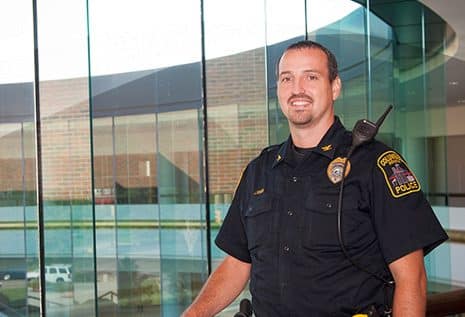A State Board of Accounts audit found that two Columbus police officers who are the subject of a criminal investigation for alleged ghost employment received monetary compensation from the city of Columbus for some of the same hours they worked at a secondary job as Columbus Regional Hospital security.
Former Columbus police officer Ronald May, who is now retired, and current Columbus patrol officer Dan Meister "received $2,294.66 and $1,501.48, respectively, in compensation from the city while working at Columbus Regional Hospital" from Jan. 1, 2013 to Aug. 31, 2018, according to a special investigation report released Wednesday by the State Board of Accounts.
The State Board of Accounts has requested each of the officers reimburse the state $2,608 for the costs of the audit.
"We hold our officers to the highest of standards," said Columbus Police Department Chief Jon Rohde. "We’ve worked hard to establish a positive relationship between our officers and citizens. Part of maintaining that trusting relationship is holding our employees accountable when they don’t follow the policies that were established to reflect our core values. In this case, we’ve held our officers accountable for their actions."
In September, the Columbus Police Department launched an internal investigation after a report about Meister was made to the police department, Rohde said. The internal investigation later expanded to include May.
On Nov. 29, as a result of the internal investigation, Meister, a 22-year veteran of the department who held the rank of lieutenant at the time, took a position as a patrol officer, Lt. Matt Harris, CPD spokesman, said in an earlier interview. Meister no longer has supervisory responsibilities with the department, Harris said.
Meister has continued to be assigned to non-law enforcement roles with the department since Nov. 29, Harris said.
Rohde said the officers’ committed "severe and significant" policy violations involving the scheduling and verification of their hours worked that "did not rise to the level of termination." However, Rohde said subsequent disciplinary action against Meister "is not out of the question" if the patrol officer is convicted of a crime.
"If an officer would be convicted of a crime, then a subsequent disciplinary action could take place that would include termination," Rohde said.
Meister and May were dismissed from their independent contractor jobs as Columbus Regional Hospital security on Nov. 30, hospital officials said.
The officers were independent contractors for the hospital system to supplement and enhance security provided by Protective Services, the hospital’s security company, said Kelsey DeClue, hospital spokeswoman, in a previous interview.
The Indiana State Police criminal investigation involving the two men is in the hands of Jackson County Prosecutor Jeffrey A. Chalfant, who was appointed special prosecutor for the case. Chalfant said Thursday the criminal investigation is ongoing, but there is no estimated time frame for when the investigation will conclude.
Chalfant acknowledged that he has received the report from the State Board of Accounts but has not reviewed it yet.
"I’ve not finished the investigation on my end in order to make a charging decision," said Chalfant, adding that the amount of material he needs to review is "very voluminous."
Chalfant said the report from the State Board of Accounts is one of many pieces of evidence he will consider when making a decision on whether to charge the officers with a crime.
"(The report) is something I would consider just like any other report from a law enforcement agency," Chalfant said.
Alan Whitted, Columbus city attorney, said the city will likely wait for the conclusion of the special prosecutor’s investigation before attempting to recover any of the payments made to the officers.
"Before the city reacts, we need to let the special prosecutor finish his investigation," Whitted said.
If the prosecutor decides not to file charges against the officers, Whitted said he would consult with the Indiana Attorney General’s office and "look at our collection options."
‘Internal controls’
The Indiana State Board of Accounts’ audit also found that CPD did not "set proper internal controls" to prevent employees from receiving unauthorized compensation.
"The department did not have a time clock and time cards were handwritten and maintained on a computer spreadsheet," the report states. "Due to the fact that department employees did not a punch a time clock, internal controls were not in place that allowed the department employees to receive compensation from the city while working at Columbus Regional Hospital. The city did not set proper internal controls over time reporting of its employees that allowed for unauthorized compensation to be paid to department employees."
Rohde said he inherited a paper time keeping system when he became police chief in 2014.
In 2015, the city purchased an electronic timekeeping system, but CPD determined the following year that the system was not capable, among other things, of managing the different pay cycles and work shifts of CPD officers, Rohde said.
In 2017, the city found a software system that would work and then went through a purchase process and then spent much of 2018 working with the city’s vendor, ExecuTime, to make the software compatible with CPD’s scheduling and pay cycles, Rohde said. By the end of 2018, CPD was testing the new electronic timekeeping system.
"Although (using an electronic timekeeping system) is something we’ve been working for since 2014, it wasn’t implemented until Jan. 1, 2019. Unfortunately, the checks and balances and everything we have in place now were not in place at the time (the incidents) happened," Rohde said.
Under the new system, each officers’ time card goes through two layers of supervisory oversight, Rohde said.
"Each officer is responsible for entering their day and time worked," Rohde said. "After that, it goes to a supervisor they work directly under who can verify that they were there at that date and that time. And after that, it goes to another level of supervisor to verify that record is accurate before it is finally approved."
Rohde said he is responsible for reviewing and approving three employees’ electronic time cards, including his secretary, the deputy chief and Lt. Matt Harris, who is the police department public information officer.
Off-duty work
Rohde said CPD officers are permitted to work off-duty security jobs, including at Columbus Regional Hospital, and do not have to notify CPD that they have accepted such a role.
"We have countless requests for off-duty security, so many that can’t even been filled," Rohde said. "Our officers’ responsibility is to make sure that they’re putting in their work time and it’s accurate and not overlapping with any other secondary position, and that’s what the expectations are."
Rohde and Harris said they do off-duty security work "from time to time" at "various places."
Sixteen CPD officers are contracted to work off-duty security at Columbus Regional Hospital as well as five Bartholomew County Sheriff deputies, Harris said.
Meister is not eligible to work off-duty security, because he does not have law enforcement powers, Harris said.
"We’ve worked so hard to build a trusting relationship with the community, and when we have officers that violate policies that don’t reflect our core values, we can’t go and undo that," Rohde said. "We can only hold them accountable for those actions. …The fact of the matter is that we have 96 other employees that work day in and day out and the utmost honesty and integrity to provide public safety services to our community and it’s unfair to have the negative actions of those two be reflected on anybody else."
[sc:pullout-title pullout-title=”Response from the officers” ][sc:pullout-text-begin]
The State Board of Accounts audit includes a response from an attorney Edward J. Merchant, Indianapolis, who represents Ronald May and Dan Meister.
"The report indicates that there were occasions where Ronald May and Dan Meister reported time worked and received compensation from the city for the same time period they reported time worked and received compensation at Columbus Regional Hospital. This conclusion is misplaced.
During their respective interviews with the SBOA, both May and Meister advised that CPD did not maintain a time clock and handwritten time cards were generated indicated the time officers were scheduled to work. May and Meister also advised that CPD officers were permitted to "flex" their time (i.e. report to work one hour early and leave work one hour early). It was common for both May and Meister to flex their time on days they were scheduled to work at Columbus Regional Hospital.
As a result of flex time, the time stated on the officers’ time cards did not always reflect the actual time worked by the officers. The time cards reflect the hours the officers were scheduled to work (example: 9 a.m. to 5 p.m.); not the hours the officers actually worked (example: 8 a.m. to 4 p.m.). Therefore, May and Meister did not receive compensation from the city for the same time period they received compensation at the Columbus Regional Hospital. May and Meister received compensation from the city for the total number of hours the officers worked at CPD in a given pay period (i.e. 80 hours)."
In response to the attorney statement within the report, Columbus Police Chief Jon Rhode said:
"Flex time is not something that is in our policies or procedures. Our internal investigation revealed that there were policy violations for how they were managing scheduling and verifying time, specifically their time," Rhode said. "Flex time is not in our policies or directives or utilized," he said.
[sc:pullout-text-end]





